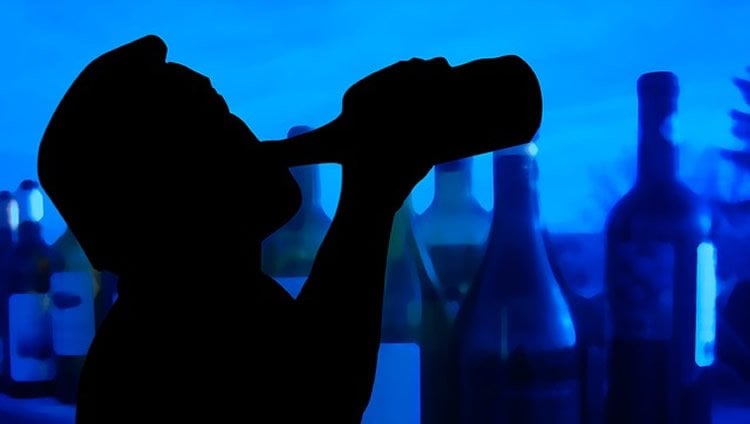Summary: Researchers identify a role for the enzyme PRDM2 in alcoholism.
Source: Linköping University
A research group under the leadership of Linköping University Professor Markus Heilig has identified an enzyme whose production is turned off in nerve cells of the frontal lobe when alcohol dependence develops. The deficiency in this enzyme leads to continued use of alcohol despite adverse consequences.
The discovery is now published in the number-one ranked psychiatric journal from the Nature Publishing Group, and could mean completely new possibilities for treating alcoholism.
“We’ve worked hard for this. The enzyme, PRDM2, has previously been studied in cancer research, but we didn’t know that it has a function in the brain,” says Markus Heilig, professor of psychiatry and head of the Center for Social and Affective Neuroscience (CSAN) at Linköping University.
He and his research group are linking together research into alcoholism and other addictive illnesses with advanced brain research. It has long been suspected that people with alcohol dependence have impaired function in the frontal lobes of the brain, but the underlying biological mechanisms have not been known. The research team behind the paper, which includes researchers from both Linköping University and University of Miami, is the first to identify this molecular mechanism.
If frontal function is impaired, it is difficult for us to control our impulses. A person with intact impulse control can walk past a bar on a warm day and think ‘A beer would be nice, but I can’t have one now because I have to get back to work’. An alcoholic does not have sufficient impulse control to refrain, thinking: ‘It’s hot and I’m thirsty’.
“PRDM2 controls the expression of several genes that are necessary for effective signalling between nerve cells. When too little enzyme is produced, no effective signals are sent from the cells that are supposed to stop the impulse,” Professor Heilig tells us.
Several years of dedicated research lie behind this breakthrough. The research, in which Dr Estelle Barbier – post-doctoral fellow at CSAN – had a central role, has shown that alcohol dependence in rats leads to a down-regulation of PRDM2 production, which in turn leads to disruption of impulse control. This is why the laboratory animals continue to consume alcohol, even when it is unpleasant. If they are subjected to stress, they also quickly relapse into drinking alcohol.

In the next step, the researchers knocked out the production of PRDM2 in the frontal lobes of rats that were not dependent, and they observed the same behaviour – impulse control was disrupted.
“We see how a single molecular manipulation gives rise to important characteristics of an addictive illness. Now that we’re beginning to understand what’s happening, we hope we’ll also be able to intervene. Over the long term, we want to contribute to developing effective medicines, but over the short term the important thing, perhaps, is to do away with the stigmatisation of alcoholism,” Professor Heilig says.
LiU researchers have worked together with colleagues including Professor Claes Wahlestedt and his co-workers at Miami University.
Source: Monica Westman Svenselius – Linköping University
Image Source: NeuroscienceNews.com image is in the public domain.
Original Research: Full open access research for “Dependence-induced increase of alcohol self-administration and compulsive drinking mediated by the histone methyltransferase PRDM2” by Barbier E, Johnstone AL, Khomtchouk BB, Tapocik JD, Pitcairn C, Rehman F, Augier E, Borich A, Schank JR, Rienas CA, Van Booven DJ, Sun H, Nätt D, Wahlestedt C, and Heilig M in Molecular Psychiatry. Published online August 30 2016 doi:10.1038/MP.2016.131
[cbtabs][cbtab title=”MLA”]Linköping University “Alcohol Dependent People May Lack Important Enzyme.” NeuroscienceNews. NeuroscienceNews, 4 September 2016.
<https://neurosciencenews.com/alcoholism-enzyme-prdm2-4960/>.[/cbtab][cbtab title=”APA”]Linköping University (2016, September 4). Alcohol Dependent People May Lack Important Enzyme. NeuroscienceNew. Retrieved September 4, 2016 from https://neurosciencenews.com/alcoholism-enzyme-prdm2-4960/[/cbtab][cbtab title=”Chicago”]Linköping University “Alcohol Dependent People May Lack Important Enzyme.” https://neurosciencenews.com/alcoholism-enzyme-prdm2-4960/ (accessed September 4, 2016).[/cbtab][/cbtabs]
Abstract
Dependence-induced increase of alcohol self-administration and compulsive drinking mediated by the histone methyltransferase PRDM2
Epigenetic processes have been implicated in the pathophysiology of alcohol dependence, but the specific molecular mechanisms mediating dependence-induced neuroadaptations remain largely unknown. Here, we found that a history of alcohol dependence persistently decreased the expression of Prdm2, a histone methyltransferase that monomethylates histone 3 at the lysine 9 residue (H3K9me1), in the rat dorsomedial prefrontal cortex (dmPFC). Downregulation of Prdm2 was associated with decreased H3K9me1, supporting that changes in Prdm2 mRNA levels affected its activity. Chromatin immunoprecipitation followed by massively parallel DNA sequencing showed that genes involved in synaptic communication are epigenetically regulated by H3K9me1 in dependent rats. In non-dependent rats, viral-vector-mediated knockdown of Prdm2 in the dmPFC resulted in expression changes similar to those observed following a history of alcohol dependence. Prdm2 knockdown resulted in increased alcohol self-administration, increased aversion-resistant alcohol intake and enhanced stress-induced relapse to alcohol seeking, a phenocopy of postdependent rats. Collectively, these results identify a novel epigenetic mechanism that contributes to the development of alcohol-seeking behavior following a history of dependence.
“Dependence-induced increase of alcohol self-administration and compulsive drinking mediated by the histone methyltransferase PRDM2” by Barbier E, Johnstone AL, Khomtchouk BB, Tapocik JD, Pitcairn C, Rehman F, Augier E, Borich A, Schank JR, Rienas CA, Van Booven DJ, Sun H, Nätt D, Wahlestedt C, and Heilig M in Molecular Psychiatry. Published online August 30 2016 doi:10.1038/MP.2016.131







